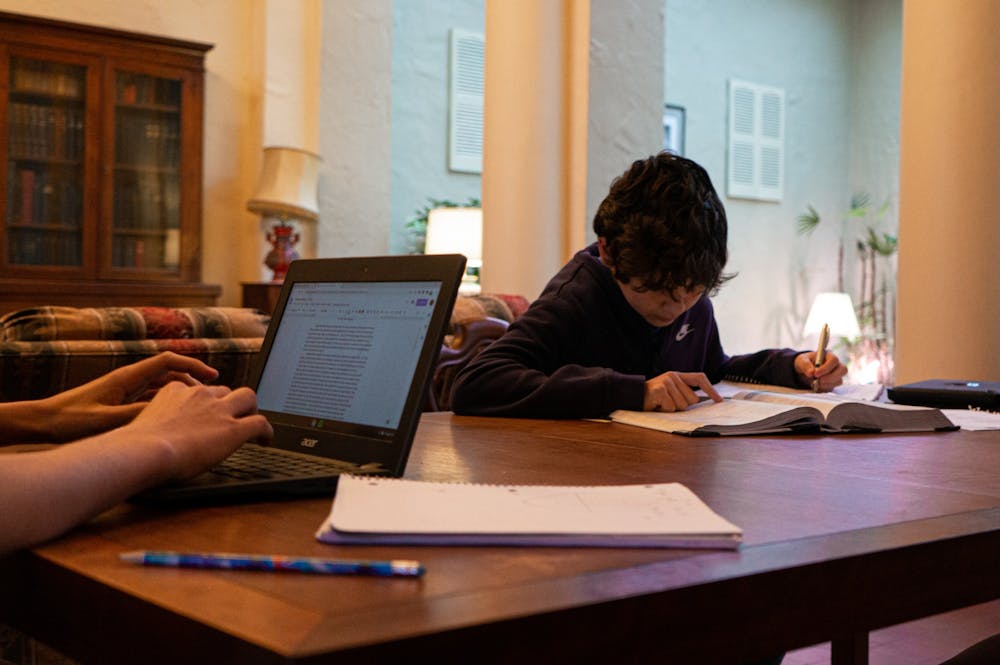Melega said in order to communicate with his students, he meets with them every Monday on Google Meet and has office hours throughout the week. He said the principal of the school created a Google Forms that teachers can fill out if they haven't been able to reach a student, and the school will follow up with the student.
“It should be easy to fall through the cracks,” he said. “But we’ve been pretty proactive targeting who hasn’t responded, to see if they’re healthy, if everything’s ok and, you know, to get them re-engaged in the schoolwork.”
The district has transitioned to a pass/incomplete/fail grading system for middle school and high school students for the remainder of the semester.
For Lauren Boening, a third grade teacher at Morris Grove Elementary School, instruction looks different.
Students in pre-K through first grade in the district are completing packets of work, while students in grades 2-5 are engaging in online and offline instruction via Google Classroom and Google Meet.
Boening said it’s important for parents to remember goals for teachers have shifted during this time.
“Feedback for an elementary school student is going to look more like a personal comment on their objective for the day,” she said.
McDougle Middle School math teacher Mary Peres-Da-Silva said she is finding positives as she navigates new ways to utilize technology and creativity to teach her students.
She said she has been utilizing apps and online tools such as Kahoot, Quizlet Live, Padlet and Flipgrid, as well as putting Bitmojis and GIFs into her Google Slides presentations, to make her teaching as interactive as possible.
“I must have gotten 57 emails (from students), ‘I can’t do this, I can’t do this,’ I’m like yes, you can do this, try this,” she said. “When they finally did do it, they were like, ‘Aha I can do this online technology, we can do this.’ They have also grown through this whole process because I feel like they’ve definitely become more confident.”
Peres-Da-Silva said she has joined a global Facebook group of online teachers who have been sharing their experiences and resources, which has also been helpful for her.
While most students in the district are still learning in some capacity, high school seniors in CHCCS are no longer required to attend classes or do schoolwork.
To get the day's news and headlines in your inbox each morning, sign up for our email newsletters.
Caroline Spencer, whose son is a senior at East Chapel Hill High School, said her son has been assigned grades in his classes based on his work from before school shut down, and his classes have been canceled.
“He's pretty much done,” she said. “He’s been accepted to college and he probably won't have a prom or graduation, and he's right now just focused on hoping that he gets to start school in the fall.”
Spencer said equity in an online learning environment can be hard to maintain due to unequal access to technology and the Internet.
The district has ordered personal WiFi devices for students without access, but Spencer pointed out many surrounding school districts have been unable to do the same. For example, Orange County Schools has pointed students without WiFi access to free Spectrum broadband services or public WiFi services in parking areas of county community centers.
Spencer, who also has an eighth grade son at Smith Middle School, said she is worried about learning gaps he will have next school year. But she said it is important to remember that the instruction students are receiving right now is not true online learning.
“What we've got now is an emergency situation,” she said. “And so in the middle of all of this remote learning, you've got teachers, parents and students who are worried about their paychecks. They're worried about their meals, they're worried about, they're missing their friends. It's a really stressful, chaotic time.”
She pointed to N.C. Virtual Public Schools as an example of true online learning, where teachers have had proper training and classes were planned with the purpose of being virtual. She said if remote schooling is extended past Gov. Roy Cooper's current May 15 deadline, or if schools remain virtual in the fall, there is a chance for online schooling to be beneficial to students provided the district starts planning soon.
“Is emergency remote learning sustainable? Absolutely not,” she said. “Is online learning sustainable? Absolutely. We just have to get to the point where that's what we're getting and not the emergency part.”
@sonjarao
@DTHCityState | city@dailytarheel.com



